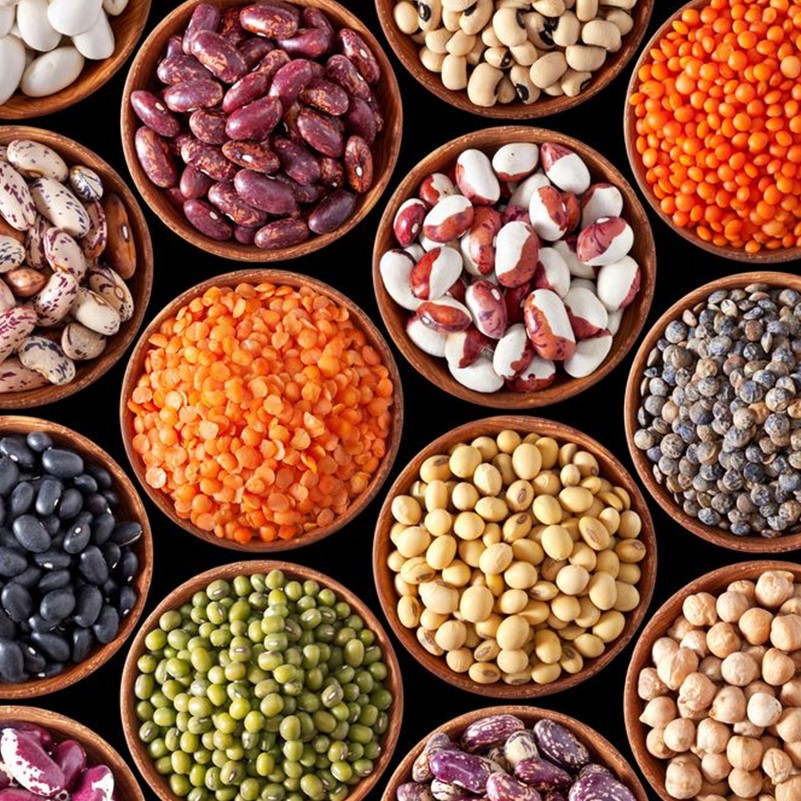By Dr. LaToya Roberts
Raised in a large Caribbean household, lentils, peas and beans were a daily staple because they’re relatively inexpensive, readily available, easy to store and were often used to stretch a meal. Some of my personal favorites are kidney beans, cannellini beans, pinto beans, chickpeas, and lentils. Black-eyed peas and fava beans, however, were not well received, and I have a traumatic scar or two from hiding them by the spoonful in strategically located potted plants.
The words legumes, beans and pulses are often used interchangeably. However, legumes technically refer to the whole plant, from leaves to roots and everything in between including stems and seed pods. Pulses on the other hand refer only to the edible seed (the actual beans, peas or lentils).
Pulses are an amazing source of plant-based protein, rich in iron, folate, calcium, magnesium, potassium, phosphorus, and zinc. They’re also naturally low in fat, and are one of the richest sources of dietary soluble and insoluble fiber, with four times more fiber than wild brown rice.
Gut dysbiosis is the fancy term used to describe unhealthy changes or disturbances in the gut microbiome. This is linked to the development of many health conditions, including obesity, diabetes, and certain cancers. Current evidence suggests that fiber-rich foods can change the gut microbiome in a good way. Recall that humans lack the digestive enzymes that can hydrolyze and break down fiber. Instead, we depend on a healthy balance of gut microbes to do the work for us. In doing so, they produce metabolites such as short-chain fatty acids (SCFAs) as a byproduct. These SCFAs are associated with abundant benefits, including strengthening and maintaining a healthy gut barrier, aiding with normal glucose levels, proper cholesterol metabolism, helping to regulate the immune system, regulating the inflammatory response, and helping with maintaining normal blood pressure. A diet that regularly includes pulses may help with weight control. The fiber, protein, and slowly digested complex carbohydrates found within pulses aid in satiety and support weight loss because they make you feel fuller longer.
Pulses are packed with polyphenols, proanthocyanins and flavonoids, which are known antioxidants. They combat cell damage and possess anticarcinogenic properties as well. Surprisingly, research done by the National Institute of Health shows that only about 8% of U.S. adults report eating legumes on any given day. In fact, pulses are so dramatically under-consumed that it is a dietary public health concern according to the United States Department of Agriculture.
The possibilities are endless when it comes to preparation and delicious recipes online are numerous. Hummus is a quick and easy favorite. Include beans on salads or in stews. Use peas to bulk up soups, in rice or even mixed in with your favorite vegetable stir fry.
Pulses contain lectins which when consumed raw contribute to bloating, gassiness and stomach discomfort in some individuals. The negative effects of lectins however are canceled after cooking. The high fiber content can also contribute to similar symptoms. I find that soaking dried beans overnight with a few teaspoons of baking soda and changing the soaking water a few times before cooking helps to minimize this. One may also start with small amounts, such as 2-4 tablespoons at a time, and gradually increase spoonful amounts as your body can tolerate. Drinking adequate amounts of water helps adjust to the fiber increase. Some may resort to taking an over-the-counter digestive aid beforehand like Beano.
So, whether you’re vegetarian or consider yourself flexitarian, my hope is that you feel more inspired to experiment with new ways to include these nutrient-dense gems into your daily diet.
LaToya Roberts, DO practices internal medicine at Harbor Internal Medicine. Her office is located in Bayside Commons suite 105, 501 Bay Avenue.in Somers Point.










